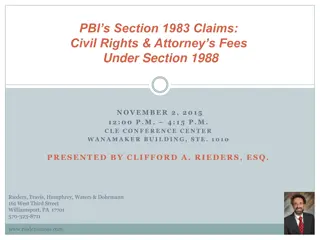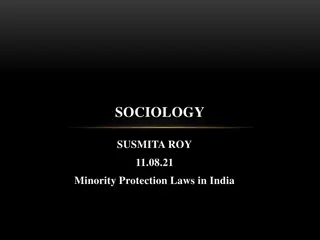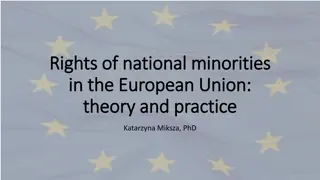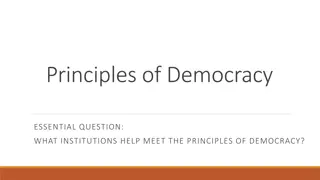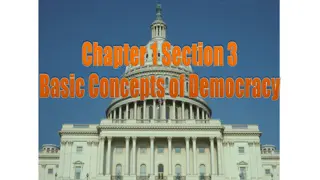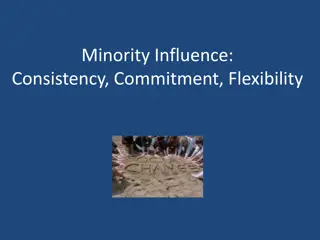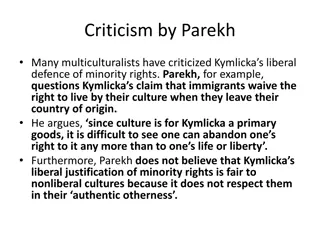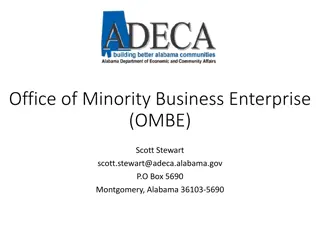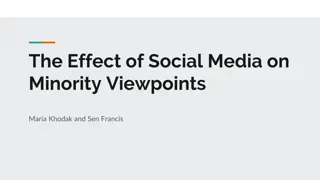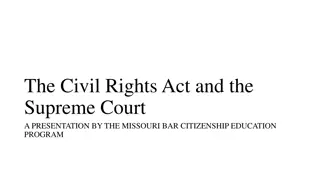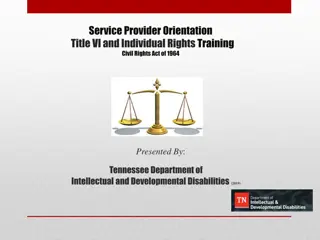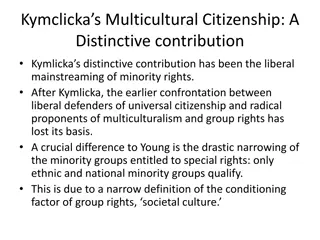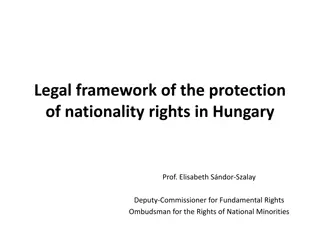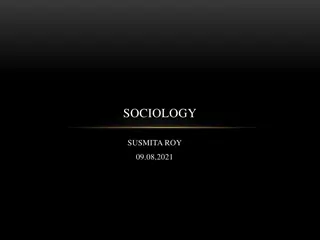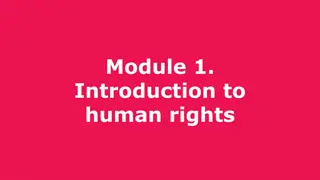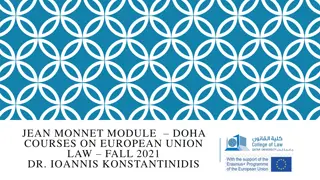Approaches to the study of Human Rights
The Marxist perspective on human rights emphasizes social rights over individual rights, viewing the full realization of self within society. Marx connects bourgeois society with human rights, highlighting how exploitation under capitalism alienates individuals. In contrast, the Third World perspect
5 views • 19 slides
Promoting Children's Rights in Education for Scotland's Learners
Raise awareness about Children's Rights, the United Nations Convention on the Rights of the Child, and how to embed them in education. Explore the importance of developing a culture that upholds rights-based practices and supports children in claiming their rights. Reflect on professional standards
1 views • 26 slides
Minority Science and Engineering Improvement Program Overview
The U.S. Department of Education's Minority Science and Engineering Improvement Program for FY 2023 aims to provide information, technical assistance, and guidance to help understand the grant opportunity. The program's purpose is to enhance science and engineering education at minority institutions
0 views • 76 slides
Understanding Human Rights: Overview and Evolution
Human rights encompass various aspects such as human needs, generations of rights, individual status, and the indivisibility of rights. Dr. Anna Ledzi ska-Simon discusses the translation of human needs into rights, the historical evolution of rights across generations, individual rights according to
3 views • 17 slides
Understanding Human Rights in Queensland Government Work
The Human Rights Act of 2019 in Queensland outlines protected rights such as equality, freedom of expression, and fair trial. All public service employees must adhere to these rights, ensuring decisions and actions respect human rights. This act applies to everyone in the Queensland Government, with
2 views • 13 slides
Understanding the Basic Concept of Human Rights in Modern Jurisprudence
Human rights are natural and inalienable, essential for human life, based on universal principles. The concept of human rights is both simple and complex, requiring societal development and political will for implementation. Rooted in natural law theory, human rights have evolved from natural law to
1 views • 24 slides
Minority Business Council Advisory Agency Overview
The Minority Business Council (MBC) serves as an advisory agency to the City Manager and City Council regarding procurement policies for small, woman, service-disabled, and minority-owned businesses in Virginia Beach. The MBC's vision is to connect contractor resources with city opportunities, while
0 views • 11 slides
Test Your Knowledge: The Big Children's Rights Quiz
Test your knowledge of children's rights with "The Big Children's Rights Quiz." The quiz includes true or false questions related to the United Nations Convention on the Rights of the Child, government responsibilities, the importance of rights, and the concept of Duty Bearers. Explore these thought
0 views • 24 slides
Legal Rights and Options for Regional Center Clients in California
This document discusses the legal rights and options available for adult regional center clients in California, focusing on clarifying their rights, reviewing support systems, exploring alternatives to conservatorship, and explaining the conservatorship process. It also covers children's and adults'
1 views • 35 slides
Reflection on Human Rights and Criminals
Explore the complex question of whether criminals should have human rights, delving into the distinctions between absolute and non-absolute rights, and the impact of child labor on human rights. Consider the removal of certain rights from criminals and engage in critical thinking exercises regarding
1 views • 19 slides
High Commissioner on National Minorities (HCNM) Mandate and Activities
The High Commissioner on National Minorities (HCNM) was established in 1992 by the OSCE to prevent conflicts related to national minority issues. Through quiet diplomacy and early warning mechanisms, the HCNM works to identify and address ethnic tensions that could threaten peace and stability among
0 views • 8 slides
Civil Rights Training Overview for SMP Participants
This civil rights training presentation covers the goals of civil rights, discrimination, protected classes, examples of discrimination, components of civil rights compliance, and the importance of equal access for all participants in the SMP program. It emphasizes equal treatment, knowledge of righ
0 views • 36 slides
Challenges and Progress in 1920s American Civil Rights Movement
The 1920s in America saw significant changes in civil rights, women's movement, and prohibition. Civil rights encompass personal freedoms guaranteed by the U.S. Constitution, including freedom of speech, voting rights, and protection from discrimination. Violations of civil rights have occurred thro
1 views • 42 slides
Understanding Section 1983 Claims and Civil Rights Attorney Fees
Section 1983 of the Civil Rights Act allows individuals to seek redress for violations of their constitutional rights by persons acting under state law. This provision does not create new rights but provides remedies for existing rights. The history of Section 1983 dates back to 1871 and has been in
0 views • 27 slides
Enhancing Minority Access to Capital through Innovative Finance Program
This program aims to address the challenges faced by minority-owned businesses in securing traditional business loans. It highlights issues such as barriers to demonstrating wealth, collateral requirements, and biases in credit scoring models. The initiative seeks to promote the growth of minority b
0 views • 16 slides
Liberal Democracy and Citizenship: Rights, Duties, and Participation
Citizenship in liberal democracies entails equal rights, duties, liberties, and constraints, with a focus on civil and political rights. The entrenchment of these rights has been key in establishing popular sovereignty and individual autonomy. Civil rights, developed in the 18th century, centered on
2 views • 16 slides
Small Business Diversity Banking Program for Minority, Women, and Veteran Business Owners
Small Business Diversity Banking Program aims to empower minority, women, and veteran-owned businesses by providing access to loans and lines of credit. Eligible businesses include those with over 50% ownership or control by minority, women, or veteran U.S. citizens in California with annual revenue
11 views • 7 slides
Evolution of Human Rights: From Ancient Times to Modern Era
Throughout history, ideas of rights and liberty have evolved, leading to the recognition of universal human rights in the modern sense. The concept of human rights can be traced back to significant historical events such as the English Bill of Rights, the Virginia Declaration of 1776, and the French
0 views • 7 slides
Human Rights and Citizenship Rights in Leisure, Sport, and Tourism: A Historical Perspective
This text delves into the intersection of human rights, citizenship rights, and leisure activities like sports and tourism. It explores the definitions, history, and declarations related to human rights, emphasizing the importance of allowing individuals the freedom to pursue leisure activities with
0 views • 20 slides
Minority Protection Laws in India: Safeguarding Diversity
India's rich diversity poses the need for robust laws to protect minority communities, ensuring their rights and safeguarding their customs. The Constitution of India upholds secularism and equality, providing provisions to safeguard minority rights and prevent discrimination based on religion, cast
1 views • 19 slides
Overview of International Human Rights Law and Treaties
This comprehensive overview delves into the foundations of international human rights law, exploring key documents such as the Universal Declaration of Human Rights, the International Bill of Rights, and various human rights treaties addressing discrimination, women's rights, children's rights, migr
0 views • 27 slides
Challenges Faced by Roma Language Education in Europe
The European Regional Forum on Education, Language, and the Human Rights of Minorities, led by Policy and Advocacy Officer Roland Ferkovics, addresses systematic and institutional barriers in Roma language education. Issues include deficiencies in state curricula, lack of teaching materials, absence
0 views • 8 slides
Rights of National Minorities in the European Union: Theory and Practice
This content delves into the protection and recognition of the rights of national minorities within the European Union. It covers various aspects such as antidiscrimination efforts, the application of non-discrimination principles, the role of Member States, and the EU's policies on minority rights.
1 views • 29 slides
Understanding the Principles of Democracy
Principles of democracy are crucial for the functioning of a democratic society. Institutions such as citizen participation, free and fair elections, accepting election results, rule of law, majority rule with minority rights, and transparency play essential roles in upholding democratic principles.
0 views • 13 slides
Key Principles of American Democracy and Social Contract Theory
The basic notions of American democracy emphasize fundamental worth, equality, majority rule with minority rights, compromise, and individual freedom. These principles can be upheld through a social contract, which may require individuals to fulfill obligations for the welfare of society. While equa
0 views • 9 slides
Understanding Minority Influence: Consistency, Commitment, and Flexibility
Minority influence involves a small group of people persuading others to adopt their beliefs, attitudes, or behaviors, leading to internalization and social change. Consistency plays a vital role in exerting influence, as it encourages others to rethink their own views. Commitment, demonstrated by l
0 views • 15 slides
Critiques of Multiculturalism by Parekh, Taylor, Barry, and Kymlicka
Many multiculturalists criticize Kymlicka's liberal defense of minority rights, questioning his views on immigrants and children of parents who emigrate. Parekh and Taylor argue against Kymlicka's approach to culture and minority rights, while Barry criticizes how multiculturalists use culture to de
0 views • 7 slides
Office of Minority Business Enterprise (OMBE) Overview
The Office of Minority Business Enterprise (OMBE) under Scott Stewart aims to support certified minority and woman-owned businesses, facilitating their participation in construction projects and accessing CDBG funds. The OMBE maintains a list of certified businesses, distributing bid notifications a
0 views • 11 slides
The Significance of Human Rights in the Modern World
Human rights are fundamental rights that belong to all individuals, are inalienable, indivisible, interconnected, and should be respected without prejudice. The Universal Declaration of Human Rights, adopted in 1948 after WWII by the United Nations, is a crucial milestone document emphasizing human
0 views • 5 slides
Enhancing Transparency in Human Rights Performance Measurement
This information focuses on initiatives like the Human Rights Measurement Initiative (HRMI) that aim to provide new data for researching and advocating human rights issues globally. The HRMI project, founded in 2015, collaborates with various stakeholders and is funded by philanthropic grants. It em
0 views • 19 slides
Electoral Systems and Minority Representation
Various electoral systems, including district and at-large voting, impact how minorities are represented in government. District systems can provide more proportional representation for minorities if they are geographically concentrated, while at-large systems often result in minority under-represen
0 views • 14 slides
Influence of Social Media on Minority Viewpoints and Critical Mass Theory
Exploring the impact of social media on minority viewpoints and how groups with minority opinions can overturn majority ideas using Critical Mass Theory. The study delves into the relationship between social media and the spread of minority views, emphasizing the potential for influencing the majori
1 views • 19 slides
The Civil Rights Act of 1964 and the Supreme Court
In the 1960s, Congress passed the Civil Rights Act of 1964, a pivotal legislation that prohibited discrimination in public accommodations. This act represented a significant shift in focus towards minority rights. The Supreme Court's past rulings on the Civil Rights Act of 1875 influenced Congress t
0 views • 24 slides
Understanding Human and Civil Rights in DIDD Services
Protecting the rights of individuals receiving Department of Intellectual and Developmental Disabilities (DIDD) services is essential. This training covers Title VI and individual rights under the Civil Rights Act of 1964, emphasizing equality and access to programs regardless of race, color, sex, d
1 views • 31 slides
Kymlicka's Multicultural Citizenship: A Distinctive Contribution
Kymlicka's unique contribution lies in the mainstreaming of minority rights within a liberal framework, shifting the discourse away from the earlier confrontation between defenders of universal citizenship and proponents of multiculturalism. His focus on societal culture and the recognition of only
0 views • 14 slides
Legal Framework for Protection of Nationality Rights in Hungary
The legal framework for protecting nationality rights in Hungary is outlined, detailing the historical background dating back to 1989 and the constitutional provisions that recognize national and ethnic minorities as State-constituting elements. The article explains the rights granted to minorities,
0 views • 40 slides
Understanding Minority Groups in Sociology
Sociologist Louis Wirth defined minority groups as those singled out in society for differential treatment due to physical or cultural characteristics, leading to collective discrimination. Membership is both objectively ascribed and subjectively applied. Minority group status can be based on race,
0 views • 12 slides
Understanding Human Rights: Module 1 Overview
This module serves as an introduction to human rights principles, instruments, and monitoring mechanisms. It covers the definition of human rights, the Universal Declaration on Human Rights, key principles, and state obligations. Human rights are universal legal guarantees that protect individuals a
0 views • 21 slides
Kymlicka's Multicultural Citizenship: A Distinctive Contribution
Kymlicka's distinctive contribution to the discourse on multicultural citizenship focuses on the liberal mainstreaming of minority rights, particularly emphasizing ethnic and national minority groups. He defines societal culture as shared history, language, and territory, excluding non-ethnic groups
0 views • 20 slides
EU Charter of Fundamental Rights and European Convention on Human Rights Overview
The course module on European Union Law in Doha focuses on the EU Charter of Fundamental Rights and its relationship with the European Convention on Human Rights. It covers topics such as the EU's accession to the Convention, external action on human rights, and the differences between the Charter a
0 views • 26 slides













